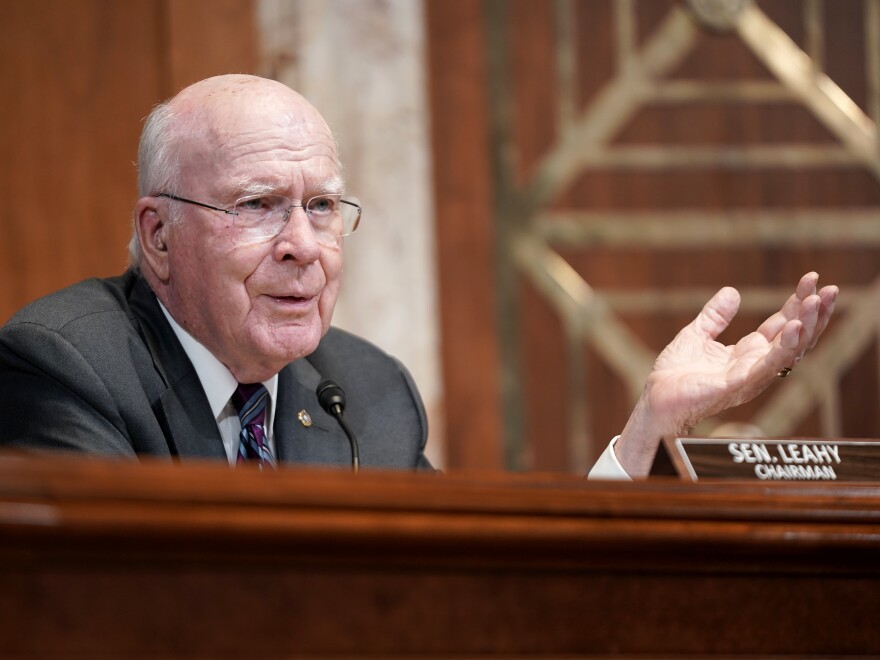Updated October 6, 2021 at 5:42 PM ET
A top Justice Department official described voting discrimination as "a current-day problem" and urged Congress to move quickly to strengthen a landmark civil rights-era voting law.
"I am here today to sound an alarm. For the Justice Department, restoring and strengthening the Voting Rights Act is a matter of great urgency," Kristen Clarke, the head of the Justice Department's civil rights division, told members of the Senate Judiciary Committee on Wednesday.
Clarke's testimony comes one day after Senate Democrats introduced legislation aimed at restoring voting protections that were lost in two Supreme Court decisions over the course of the last decade, Shelby County v. Holder and Brnovich v. Democratic National Committee.
Democrats have been pushing for federal legislation to protect voting rights, fighting against a slew of voting restrictions enacted in Republican-led states.A version of the legislation, named for the late congressman and civil rights icon John Lewis of Georgia, passed in the House earlier this year.

The sponsor of the Senate bill, Vermont Sen. Patrick Leahy, said he was alarmed at the "toxic and partisan rhetoric around restoring the Voting Rights Act" this year, noting that bipartisan majorities in Congress have reauthorized the Voting Rights Act in the past
But Democratic efforts to pass any federal voting rights legislation, including this bill, have been rejected by Republicans this year who have dismissed it as unnecessary and a Democratic "power grab," as Texas Sen. Ted Cruz did on Wednesday.
"This bill is an assault on democracy," Cruz said, describing the effort as "cynical" and "wrong."
This effort is separate from a pared-down voting rights and elections bill introduced last month. That legislation, the Freedom to Vote Act, was the product of negotiations among a group of Senate Democratic lawmakers including Majority Leader Chuck Schumer and West Virginia Sen. Joe Manchin. The act would establish some federal guidelines on ballot access, in response to voting restrictions enacted by Republican-led state legislatures around the country.
Manchin had been the lone Democratic holdout in supporting the For the People Act, a more sweeping piece of legislation, and has been in conversation with Republicans, hoping to win over some support for the scaled-back bill. So far, Manchin has found no takers among the 50 members of the Republican caucus.
Senate Minority Leader Mitch McConnell has said it would receive no Republican support, criticizing the legislation as a federal takeover of state election administration.
Schumer on Tuesday called the John Lewis Voting Rights Advancement Act an "important complement" to the Freedom to Vote Act, and he's promised to hold a vote on the Freedom to Vote Act as soon as this week.
Other Democratic lawmakers who spoke on the Senate floor Tuesday, including Georgia Sen. Raphael Warnock, said it was essential to pass both pieces of legislation.
"The John Lewis Voting Rights Advancement Act builds for us a fire station to protect against future fires," he said. "The house of democracy is already on fire, so we need the John Lewis Voting Rights Advancement Act, but we also need the Freedom to Vote Act. We've got to put out the fire, we've got to build a fire station for future fires."
Warnock, who counted the late Congressman Lewis as one of his parishioners at Ebenezer Baptist Church in Atlanta, said that he believed as Lewis did, that voting is "a sacred undertaking."
"Voting rights are preservative of all other rights. Voting rights are about the foundation of our democracy," he said. "I believe that if the world's greatest deliberative body can't find a way forward to get this done, history will judge us harshly — and rightly so."
Copyright 2021 NPR. To see more, visit https://www.npr.org.


